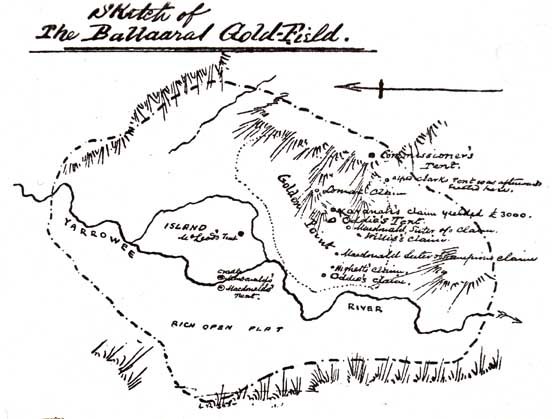Police
Contents
Goldfields Police
The police culture in 1854 was that of an armed paramilitary gendarnmerie. troopers and police were garrisoned in centralised posts, such as the Ballarat Government Camp., and not permitted to fraternise with civilians.[1]
130 military pensioners resident in Van Diemen's Land (Tasmania) were hired by the Victorian Government.[2]
By January 1853 there were 230 mounted police in the Victorian Colony. By 1845 it had risen to 485, including nine mounted detectives. [3]
Ballarat Police
The first police camp was established at Golden Point, moving to the Camp Street location in mid-1852.
After the Eureka Stockade battle an eyewitness, Alfred Madocks, wrote of the police:
- That hated body of men, the troopers, committed acts of most wanton barbarity, murdering inoffensive people. (They had had none of the fighting being kept as a reserve). As an instance – one man living a long way from the scene and in bed with his wife was dragged from her arms and murdered in his tent, which they afterwards fired. They thus at one blow deprived her of her husband and everything she was possessed of. Some of these Gentlemen have since been picked off – they are all spotted and vengeance is not wanting.[4]
Uniforms
Soft peaked cap.
Gold Escort
Troopers
Thomas Atkins, John Badcock, Charles Carter, Hussey Chomley, Michael Costelloe, John Culkin, Robert Evans, John Gillman, Henry Foster, George Fraser, Samuel Furnell, William Kelly, John King, Ladislaus Kossak, James Langley, Michael Lawler, Robert McLister, Thomas Milne, Robert Milne, Constable Nugent, Andrew Peters, John Sadlier, William Thompson, Edward Viret, Maurice Ximenes
Newspaper Articles
Mount Alexander Mail 17.06.1854 OUR POLICE AT THE GOLDFIELDS Any-one visiting our various diggings and inquiring into the arrangements that are made for the protection of the people, would be struck with wonder and astonishment at the inconsistency which characterises the disposition of the police. The lavish expenditure which may be noticed in some places, and the miserable pittance in numbers of men whcih is doled out in others, almost induces a belief that the heads of the Departments are not very well qualified for their posts, or what is still worse, that they are ignorant of how these things are managed. The police of this colony have been gradually getting into a state of discipline and although there may be instances of misconduct amongst them, yet upon the whole it is admitted that they are becoming an effective body. They are looked upon by the people as their natural protectors, as a check upon crime, without the aid of whom naught but murder, Rapine, and Robbery would be stalking abroad, it is , therefore, the more important that the strength of the force should be so distributed as to be brought to bear most effectively upon the districts where the population is most extensive. It is because we are desirous to see this principle carried out into practice that we propose to bring before our readers a few statistical facts that will place the past and present regulations in rather a curious light. We here tofore have thought that the extent of a police establishment was regulated by a number of the population of the district but from what has lately come to our knowledge it is not so, but upon some other principle unknown to us. At McIvor, for instance, where the population amounts to some 300 to 400 people, the police numbered, until very lately, about 100 men, including the mounted police. At the Goulburn, again, the population of which we are informed does not exceed 200, the police force amounts to 60 men. At Fryers Creek and Loddon, with a population of 4,000, they have 12 men to guard them – Whilst a Tarrangower, with a population of 20,000, the whole force does not exceed 18 when, nine of whom are constantly on duty on the camp guarding the Gold-office, etc ......
Mount Alexander Mail 20.10.1854 DARING ROBBERY OF THE BALLARAT BRANCH OF THE BANK OF VICTORIA Intelligence was received in Melbourne Tuesday afternoon of the perpetration of a most daring and extensive robbery on the Bank of Victoria, Ballaarat, the thieves having succeeded in carrying away a booty of some 4-5 thousand pounds in notes, and about 230 ounces of gold. The accounts of the outrage, as yet come to hand are: About one p.m. on Monday, four disguised and armed men suddenly marched into the Bank when none, but the manager and one or two clerks were there, and one of them presenting and snapping a loaded pistol (Which luckily miss fired) at the manager, (they (without resistence) took away a number of bank-notes, and five bags of gold marked ‘T.Forsyth,’ containing 68 ozs 8 dwts 12 grs, 32 ozs 19dwts, 51 ozs 7 dwts 12 grs, 57 ozs 5 dwts, and 23 ozs 6 dwts total; 233 ozs 6 dwts. The notes are all £10 ones, the numbers from 18,501 to 18,900, having all disappeared. How the robbers got away with impunity, or what they subsequently did, does not appear on the face of the reports; but it is supposed thay had taken the route for Melbourne. They are thuse described. Viz...........(photocopy available)
References
- ↑ Blake, Gregory, To Pierce the Tyrant's Heart,Australian Military History Publications, 2009, p.75.
- ↑ Blake, Gregory, To Pierce the Tyrant's Heart,Australian Military History Publications, 2009, p.75.
- ↑ Blake, Gregory, To Pierce the Tyrant's Heart,Australian Military History Publications, 2009, p.75.
- ↑ Anthony Fyson, Eyewitness at Eureka IN History Today Volume: 54 Issue: 12 2004.
